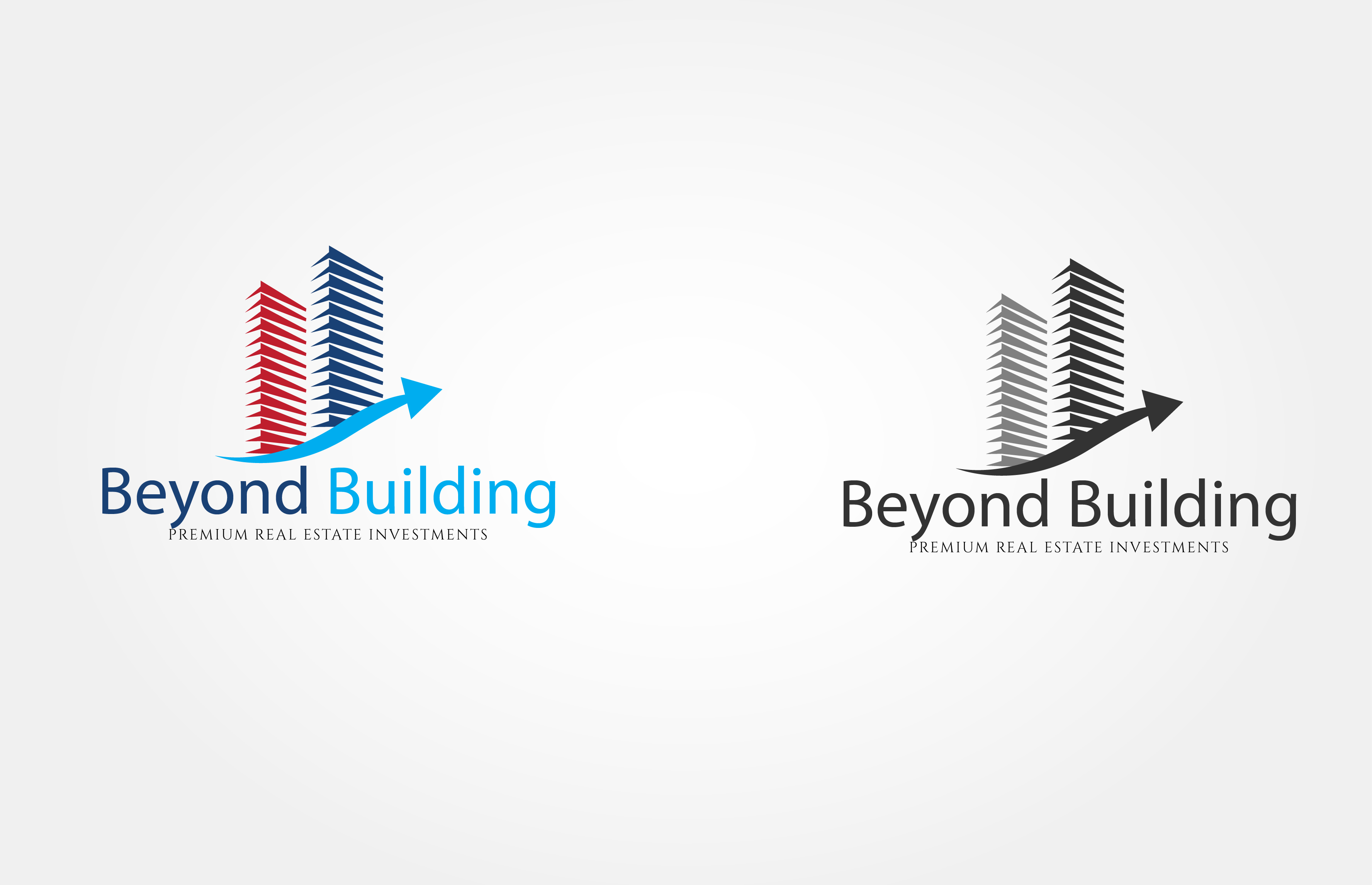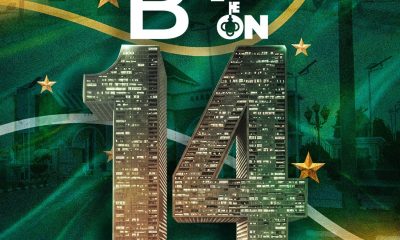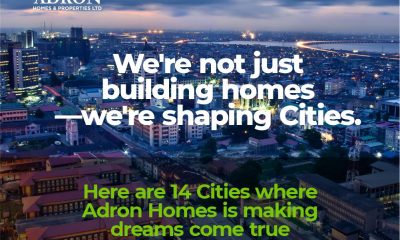Business
BEYOND BUILDING INVESTMENT AIMS TO ENRICH INVESTORS IN REAL ESTATE

Real estate has been existing for long and will continue to exist even after we are gone. The richest people in the world have invested heavily in real estate. Show me a man who has invested wisely in real estate and I will show you a silent billionaire.
There are vast opportunities to invest in real estate but how many are brave enough to take the plunge? Unless you break the fear barrier, you can never start, and unless you start you can never win. But if you are ready, this series offers you much more. It is about a new approach to real estate investment and wealth creation, sourced from about three decades’ experience in real estate and property development. It will guide you to break through several barriers and find your own fortune in the pool. So, if you have missed out on different opportunities in the past, here is your chance to take them back, or better still, to see and seize more now and create a better future. Wealth in real estate is real; realizing it for yourself is the big deal.
If you have or about to make up your mind about real estate, then let us introduce you to Beyond Building Investment Limited, a diverse commercial real estate investment company that provides a range of services to the capital markets which include: Acquisition, Asset and Property management, Leasing, Construction Management, Investment Advisory Services, as well as Development and Disposition.
Beyond Building Investment Limited as a brand uses Integrity, Ethics and Passion to define its dealings with clients and investors. Being very skilled, equipped and experienced you can be sure of top notch real estate developments from them.
Beyond Building Investment Limited aims to enrich investors by providing safe and sound real estate investment services to reduce systemic risk and also generate positive returns and improve Nigeria’s standard of living through real estate and agriculture. They intend to e create asset value for clients and real estate investors. We are not afraid to continually challenge conventional wisdom and actively encourage change in order to pursue growth. We are committed to putting our clients at the heart of our business, developing and maintaining long-standing relationships based on trust.
Using its core values of Integrity, Passion, Productivity, Innovation and Excellence, to optimize client’s portfolios, and address the associated risks and challenges of real estate ownership. And also to promote Nigeria Agricultural sector, by empowering farmers through processing and education to make food secure.
Beyond Building Investment Limited services are so professional that they ensure the following for their clients and investors, they research and identify bottom-up investment opportunities within asset classes according to our pragmatic value investment philosophy. They also specialize in sourcing, capitalizing and managing real estate investments across Nigeria and Africa by evaluating opportunities from individual properties to portfolios that offer underlying value across all real estate asset categories. They also design and blend multi asset portfolios based on a deep understanding of long term growth goals. And identifies ways to protect capital from excessive risk through underlying security selection, managing exposure to asset classes and their risk premia. They also help clients make informed decisions to achieve a competitive advantage by managing risk, reducing costs and increasing operational efficiencies.
With Beyond Building Investment Limited, you can be sure of Trusted Analysis for Every Segment of the Real Estate Housing Industry through its experienced team of consultants. They provide valuable strategic perspectives that would help clients set goals
and create a plan to achieve them. Beyond Building Investment Limited customizes the level of analysis to suit client’s needs, using their proprietary demand models. They also use consumer research programs, including surveys and focus groups, to build the confidence needed to design the right community with the appropriate amenities and segmentation. You can be sure that Beyond Building Investment Limited’s research has produced a unique approach to home product segmentation which enables their clients to maximize their investment–often capturing millions of unrecognized dollars. Also having a good proprietary model that reconciles home buyer household growth with sales velocity. This tool offers great insight into the household composition (young couples, empty nesters, etc.) of home buyers by home price range and what the future growth will be, so you can build accordingly.
With all above listed attributes you can see that Beyond Building Investment Limited offers all the professionalism you need to invest and reap optimum returns in the real estate sector. So engage them and have them answer all your real estate questions and concerns and guide you on the right way to make investments and reap the amazing rewards in real estate.
Business
Nigeria’s Inflation Drops to 15.10% as NBS Reports Deflationary Trend

Nigeria’s headline inflation rate declined to 15.10 per cent in January 2026, marking a significant drop from 27.61 per cent recorded in January 2025, according to the latest Consumer Price Index (CPI) report released by the National Bureau of Statistics.
The report also showed that month-on-month inflation recorded a deflationary trend of –2.88 per cent, representing a 3.42 percentage-point decrease compared to December 2025. Analysts say the development signals easing price pressures across key sectors of the economy.
Food inflation stood at 8.89 per cent year-on-year, down from 29.63 per cent in January 2025. On a month-on-month basis, food prices declined by 6.02 per cent, reflecting lower costs in several staple commodities.
The data suggests a sustained downward trajectory in inflation over the past 12 months, pointing to improving macroeconomic stability.
The administration of President Bola Ahmed Tinubu has consistently attributed recent economic adjustments to ongoing fiscal and monetary reforms aimed at stabilising prices, boosting agricultural output, and strengthening domestic supply chains.
Economic analysts note that while the latest figures indicate progress, sustaining the downward trend will depend on continued policy discipline, exchange rate stability, and improvements in food production and distribution.
The January report provides one of the clearest indications yet that inflationary pressures, which surged in early 2025, may be moderating.
Bank
Alpha Morgan to Host 19th Economic Review Webinar

Alpha Morgan to Host 19th Economic Review Webinar
In an economy shaped by constant shifts, the edge often belongs to those with the right information.
On Wednesday, February 25, 2026, Alpha Morgan Bank will host the 19th edition of its Economic Review Webinar, a high-level thought leadership session designed to equip businesses, investors, and individuals with timely financial and economic insight.
The session, which will hold live on Zoom at 10:00am WAT and will feature economist Bismarck Rewane, who will examine the key signals influencing Nigeria’s economic direction in 2026, including policy trends, market movements, and global developments shaping the local landscape.
With a consistent track record of delivering clarity in uncertain times, the Alpha Morgan Economic Review continues to provide practical context for decision-making in a dynamic environment.
Registration for the 19th Alpha Morgan Economic Review is free and can be completed via https://bit.ly/registeramerseries19
It is a bi-monthly platform that is open to the public and is held virtually.
Visit www.alphamorganbank to know more.
Business
GTBank Launches Quick Airtime Loan at 2.95%

GTBank Launches Quick Airtime Loan at 2.95%
Guaranty Trust Bank Ltd (GTBank), the flagship banking franchise of GTCO Plc, Africa’s leading financial services group, today announced the launch of Quick Airtime Loan, an innovative digital solution that gives customers instant access to airtime when they run out of call credit and have limited funds in their bank accounts, ensuring customers can stay connected when it matters most.
In today’s always-on world, running out of airtime is more than a minor inconvenience. It can mean missed opportunities, disrupted plans, and lost connections, often at the very moment when funds are tight, and options are limited. Quick Airtime Loan was created to solve this problem, offering customers instant access to airtime on credit, directly from their bank. With Quick Airtime Loan, eligible GTBank customers can access from ₦100 and up to ₦10,000 by dialing *737*90#. Available across all major mobile networks in Nigeria, the service will soon expand to include data loans, further strengthening its proposition as a reliable on-demand platform.
For years, the airtime credit market has been dominated by Telcos, where charges for this service are at 15%. GTBank is now changing the narrative by offering a customer-centric, bank-led digital alternative priced at 2.95%. Built on transparency, convenience and affordability, Quick Airtime Loan has the potential to broaden access to airtime, deliver meaningful cost savings for millions of Nigerians, and redefine how financial services show up in everyday life, not just in banking moments.
Commenting on the product launch, Miriam Olusanya, Managing Director of Guaranty Trust Bank Ltd, said: “Quick Airtime Loan reflects GTBank’s continued focus on delivering digital solutions that are relevant, accessible, and built around real customer needs. The solution underscores the power of a connected financial ecosystem, combining GTBank’s digital reach and lending expertise with the capabilities of HabariPay to deliver a smooth, end-to-end experience. By leveraging unique strengths across the Group, we are able to accelerate innovation, strengthen execution, and deliver a more integrated customer experience across all our service channels.”
Importantly, Quick Airtime Loan highlights GTCO’s evolution as a fully diversified financial services group. Leveraging HabariPay’s Squad, the solution reinforces the Group’s ecosystem proposition by bringing together banking, payment technology, and digital channels to deliver intuitive, one-stop experiences for customers.
With this new product launch, Guaranty Trust Bank is extending its legacy of pioneering digital-first solutions that have redefined customer access to financial services across the industry, building on the proven strength of its widely adopted QuickCredit offering and the convenience of the Bank’s iconic *737# USSD Banking platform.
About Guaranty Trust Bank
Guaranty Trust Bank (GTBank) is the flagship banking franchise of GTCO Plc, a leading financial services group with a strong presence across Africa and the United Kingdom. The Bank is widely recognized for its leadership in digital banking, customer experience, and innovative financial solutions that deliver value to individuals, businesses, and communities.
About HabariPay
HabariPay is the payments fintech subsidiary of GTCO Plc, focused on enabling fast, secure, and accessible digital payments for individuals and businesses. By integrating payments and digital technology, HabariPay supports innovative services that make everyday financial interactions simpler and more seamless.
Enquiries:
GTCO
Group Corporate Communication
[email protected]
+234-1-2715227
www.gtcoplc.com
-

 celebrity radar - gossips6 months ago
celebrity radar - gossips6 months agoWhy Babangida’s Hilltop Home Became Nigeria’s Political “Mecca”
-

 society6 months ago
society6 months agoPower is a Loan, Not a Possession: The Sacred Duty of Planting People
-

 society5 months ago
society5 months agoReligion: Africa’s Oldest Weapon of Enslavement and the Forgotten Truth
-

 news6 months ago
news6 months agoTHE APPOINTMENT OF WASIU AYINDE BY THE FEDERAL GOVERNMENT AS AN AMBASSADOR SOUNDS EMBARRASSING










You must be logged in to post a comment Login